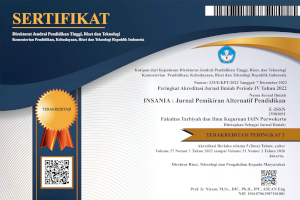Konsep Belajar Dan Pembelajaran Menurut Qs. An-Nahl : 78
DOI:
https://doi.org/10.24090/insania.v18i2.1462Abstract
Abstract: This research was conducted to find literature that the concept of teaching and learning according to QS. An-Nahl: 78 that can be applied by teachers in order to address the morality of decadence learners in Indonesia. Data collection techniques used in the research literature is documentation techniques. The instruments used in this documentation technique check-list is used to record a variety of data that have been obtained related to the concept of teaching and learning according to QS. An-Nahl: 78. Sentences used in the form of a check-list-free sentences. Once the data is collected, then analyzed the data using inductive data analysis techniques through four stages. First, reading the transcript (in the form of text or scientific work) to find the categories then conceptualized into themes and sub-themes. Second, develop the themes that emerged to reread the various transcripts. Third, do the coding process to systematize the themes that have been developed. Fourth, bring out common themes and sub-theme based on the results of coding and analyzing these themes. Based on the results of research conducted by the authors have obtained fifteen findings. There were seven findings regarding the concept of learning by QS. An Nahl: 78 and eight findings about the concept of learning by QS. An-Nahl: 78. Keywords : Learn, Learning, QS. An-Nahl: 78, Thanksgiving.Downloads
Downloads
Published
How to Cite
Issue
Section
License
Authors who publish with this journal agree to the following terms:
Authors retain copyright and grant the journal right of first publication with the work simultaneously licensed under a Creative CommonsAttribution-ShareAlike License that allows others to share the work with an acknowledgment of the work's authorship and initial publication in this journal.
Authors are able to enter into separate, additional contractual arrangements for the non-exclusive distribution of the journal's published version of the work (e.g., post it to an institutional repository or publish it in a book), with an acknowledgment of its initial publication in this journal.
Authors are permitted and encouraged to post their work online (e.g., in institutional repositories or on their website) prior to and during the submission process, as it can lead to productive exchanges, as well as earlier and greater citation of published work (See The Effect of Open Access).








